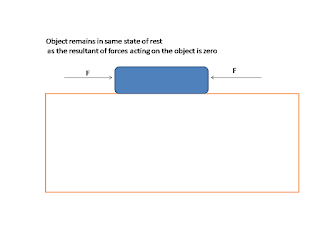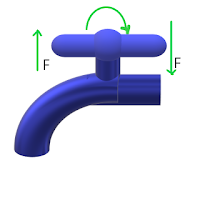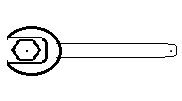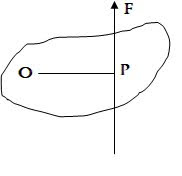Thursday, October 21, 2021
MOCK TEST ICSE PHYSICS
Tuesday, June 1, 2021
Equilibrium of Body - Class 10 Physics ICSE
Equilibrium of Body Class 10 Physics ICSE
Equilibrium of Bodies
When a number of forces acting on a body produce no change in
its state of rest of linear motion or rotational motion, the body is said to be
in a state of equilibrium.
1. Static equilibrium
A number of forces acting on a body and the body remains in
the state of rest under the influence of those forces.
ex:1 when two equal and opposite forces act up on a body
lying on a flat surface, the body remains at rest. Hence that body is in static
equilibrium.
ex: 2 The beam balance with equal weights on both pans is in
static equilibrium because the anticlockwise moment of force balances the
clockwise moment of force.
2. Dynamic Equilibrium
If a body remains in the state of motion (translational or
rotational) under the influence of several forces then that body is said to be
dynamic equilibrium.
ex 1 : The weight of a falling rain drop balances the sum of
the buoyant force and the force due to friction. Hence the falling rain
drop will be in dynamic equilibrium and
falls down with a constant velocity.
ex 2 : When the weight of an aeroplane is balanced by the upward
lift the aeroplane moves at a constant
height.
Conditions for equilibrium:
1. The resultant of all the forces acting the body should be
zero.
2. The algebraic sum of moments of all the forces acting on
the body about the point of rotation should be zero.
Wednesday, May 26, 2021
Couple and Moment of Couple and example
ICSE PHYSICS Couple and Moment of Couple
Couple
When a force is applied in a pivoted body it causes that body
to rotate about the axis passing through the pivoted point.
Actually the rotation of the body is not only due to the force applied but also due to the equal and opposite force of reaction at the pivoted point. This pair of forces formed by the external force and the force of reaction is called couple.
When you open or shut a door by applying force at the handle
an equal and opposite force of reaction is produced at the pivoted point.
If you need a large turning effect to turn an object pivoted
at a point then you have to apply two forces of equal magnitude but opposite to
each other which turns the body in the same direction.
To turn a water tap we have to apply two forces of equal
magnitude but in opposite direction.
Other examples:
1. Tightening the cap of a bottle.
2. Turning a key in a lock.
3. Turning a steering wheel.
Moment of couple
Let us take a bar of
length 'd' and it is pivoted at a point ‘O’.
Two equal forces are applied at points A and B at the same
time but in opposite direction and the bar turns in clockwise direction.
The moment of force at ‘O’ due the force applied at A = FxOA
The moment of force at ‘O’ due the force applied at B = FxOB
The total moment of both forces =
FxOA + FxOB = Fx(OA + OB) = FxAB = Fxd
hence the moment of couple = F x d
Sunday, May 23, 2021
Applications of Moment of Force
Common applications (examples) of moment of force - Physics Notes ICSE
1. To
open or shut a door, a force is applied normal to the door at its handle which
is provided at the maximum distance from the hinges.
2.
To turn a steering wheel we apply a force tangentially on the rim of the wheel.
3.
In a bicycle the toothed wheel of bigger size can be turned by applying a force
on the foot pedal and this toothed wheel is joined to the rear wheel of smaller
size by a chain passing over their teeth.
4. A
spanner is provided with a long handle which is used to tighten or loosen a nut
by applying a small force normally at the end of the handle.
5. A
jack screw a long arm so that it can be rotated by applying a small force to
raise or lower the load table.
Important: In all these cases larger the perpendicular distance less is
the force needed to produce the same moment of force.
The
moment of force not only depends on the magnitude of the Force but also on the perpendicular
distance of the line of the applied action from the axis of rotation.
Saturday, May 22, 2021
Clockwise and anticlockwise moments
Clockwise and anticlockwise moments of Force - Notes
Conventionally,
If
the turning effect on the body turns it anticlockwise and the moment of force
is called anticlockwise moment and taken positive. The direction of
anticlockwise moment is along the axis of rotation outwards i.e moment of force
is a vector quantity.
Thursday, May 6, 2021
What is Moment of Force - Torque ?
Moment of a force - Torque - ICSE - Notes
A.
Translational Motion : The motion of a body in a straight path is called
translational motion.
B.
Rotational Motion : The motion of a body which rotates about an axis passing
through a point at which that body pivoted.
Moment (Turning effect) of a force (or) Torque:
The turning
effect of force acting on a body about an axis is called the moment of force or
torque.
Factors
affecting the turning of a body:
i) The magnitude of the force applied on
the body.
ii) The perpendicular distance of line of
action of force from the axis of rotation.
|
Maximum turning of a body is produced when the perpendicular
distance of line of action of force from
the fixed point is maximum for a given force.
1.
If
the force applied on a body causes clockwise rotation the
moment of force is called
clockwise moment.
2.
If
the force causes anticlockwise rotation then the moment of force is called
anticlockwise moment.
Units
of Moment of force
S.I
unit newton-meter (N-m)
C.G.S
unit dyne-cm
1 N-m
= 107 dyne-cm
-
Clockwise and anticlockwise moments of Force - Notes Conventionally, If the turning effect on the body turns it anticlockwise and the mome...








